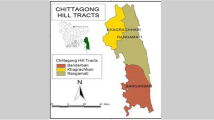Abstract
Why does polygamy still persist when changing circumstances challenge the conventional wisdom that polygamy and numerous progeny provide social security in old age? To answer this question an in-depth questionnaire survey of 253 retired Zulu male migrants resident in rural areas examined the relationship between polygamy, economic security, and quality of life after return migration. Results indicate that polygamous marital status contributes only indirectly to feelings of enhanced well-being relative to economic advantage and good health. It is concluded that despite changing economic circumstances a traditionally-oriented polygamous head of a Zulu household may still expect to feel optimistic about his social and spiritual security in old age. Further research is required to explore Zulu women's views regarding the longer-term advantages of polygamy throughout the life course.
Similar content being viewed by others
References
Boserup, E. 1970 Women's Role in Economic Development. London: George Allen and Unwin.
Bradburn, N.M. 1969 The Structure of Psychological Well-being. Chicago: Aldine.
Cain, M. 1985 On the Relationship Between Landholding and Fertility. Population Studies 39:5–15.
Carneiro, R.L. ed. 1967 The Evolution of Society: Selections from Herbert Spencer's Principles of Sociology. Chicago.
Chavunduka, G.L. 1979 Polygyny Among Urban Shona and Ndebele Christians. Nada 12(1): 10–20.
Chojnacka, H. 1980 Polygyny and the Rate of Population Growth. Population Studies 34(1):91–107.
Coult, A.D. and R.W. Habenstein 1965 Cross-tabulations of Murdock's World Ethnographic Sample. Columbia, Missouri.
Dorjahn, V.R. 1959 The Factor of Polygyny in African Demography. In Continuity and Change in African Culture. W.R. Bascom and M.J. Herskovits, eds. Pp. 87–112. Chicago: University of Chicago Press.
Ember, M. 1974 Warfare, Sex Ratio, and Polygyny. Ethnology 13(2):197–206.
Goody, J. 1973 Polygyny, Economy, and the Role of Women. In The Character of Kinship. J. Goody, ed. Pp. 175–190. London: Cambridge University Press.
Heath, D.B. 1958 Sexual Division of Labour and Cross-cultural Research. Social Forces 37 (October): 77–79.
Helander, G. 1958 Must We Introduce Monogamy: A Study of Polygamy as a Mission Problem in South Africa. Pietermaritzburg: Shuter and Shooter.
Holleman, J.F. 1962 Cash, Cattle or Women: A Conflict of Concepts in a Dual Economy. Durban: Institute of Social Research, University of Natal.
Lee, G.R. 1979 Marital Structure and Economic Systems. Journal of Marriage and the Family 41 (November): 701–713.
Møller, V. 1988a Quality of Life in Retirement: A Case Study of Zulu Return Migrants. Social Indicators Research 20:621–658.
Møller, V. 1988b Some Thoughts on Black Urbanization After the Abolition of Influx Control. In Towards Freehold? Options for Land and Development in South Africa's Black Rural Areas. C.R. Cross and R.J. Haines, eds. Pp. 146–157. Cape Town: Juta.
Møller, V. and L. Schlemmer 1981 Contract Workers and Job Satisfaction: A Study of Job Aspirations, Motivations and Preferences Among Migrants in Durban. Durban: Centre for Applied Social Sciences, University of Natal.
Møller, V. and L. Schlemmer 1989 South African Quality of Life: A Research Note. Social Indicators Research 21:279–291.
Møller, V. and G.J. Welch 1985 Polygamy and Well-being Among Zulu Migrants. Durban: Centre for Applied Social Sciences, University of Natal.
Neugarten, B.L., R.J. Havighurst, and S.S. Tobin 1961 The Measurement of Life Satisfaction. Journal of Gerontology 16:134–143.
Osmond, M. 1965 Toward Monogamy: A Cross-cultural Study of Correlates of Type of Marriage. Social Forces 44 (September): 8–16.
Spiegel, A.D. 1982 Spinning off the Developmental Cycle: Comments on the Utility of a Concept in the Light of Data from Matatiele, Transkei. Social Dynamics 8(2):30–45.
Ware, H. 1979 Polygyny: Women's Views in a Transitional Society, Nigeria 1975. Journal of Marriage and the Family 41 (February): 185–195.
Welch, C.E. and P.C. Glick 1981 The Incidence of Polygamy in Contemporary Africa: A Research Note. Journal of Marriage and the Family 43 (February): 191–193.
Whiting, J.W.M. 1964 Effects of Climate on Certain Cultural Practices. In Exploration in Cultural Anthropology. W.H. Goodenough, ed. Pp. 511–544. New York: McGraw-Hill.
Author information
Authors and Affiliations
Additional information
The University of Natal rejects apartheid. It is an equal opportunities, affirmative action University.
Rights and permissions
About this article
Cite this article
Møller, V., Welch, G.J. Polygamy, economic security and well-being of retired Zulu migrant workers. J Cross-Cultural Gerontol 5, 205–216 (1990). https://doi.org/10.1007/BF00116999
Issue Date:
DOI: https://doi.org/10.1007/BF00116999




